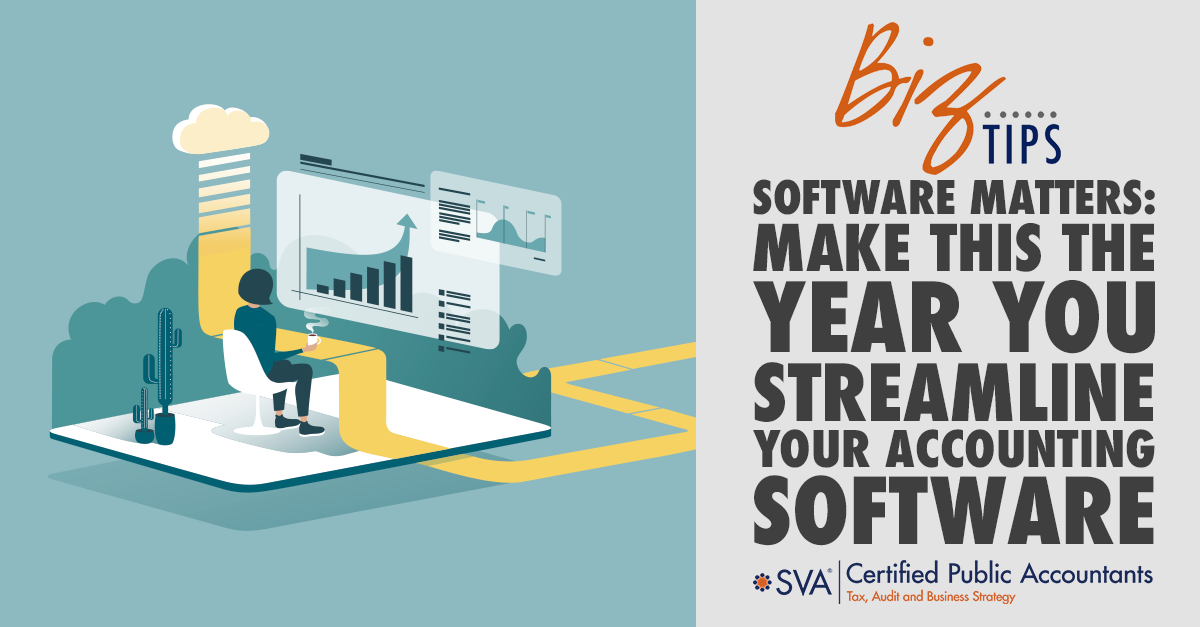Financial reporting can be status quo. You’ve always done it that way, so why not keep on that path? You have software, so why change now? But with constant time crunches, wouldn’t you be better off really looking at what you need and how you are getting that data?
How many spreadsheets do you use to analyze data outside of your accounting software? Do you really have the right software for your needs? Less manual interaction should be your financial reporting goal this year. Now is the time to assess how to streamline your accounting software so you can make better business decisions in real-time.
Things to Consider When Evaluating Software
Choosing a new accounting software system should not be taken lightly. Accounting software is essential for running a financially healthy business. As you compare different products, here are 3 considerations:
1. Flexibility
Most people tend to think about what their current pain points are, but accounting software is an investment of both time and money. It’s important to not only think about your current needs but also the future needs of the organization as well.
Create a wish list and prioritize by importance. Also document each time you're preparing a report or creating something outside of your accounting system.
The purpose of accounting software is to automate as many processes as you can to eliminate human error, so this step will assist with your evaluation of various accounting systems.
2. Cloud Accounting
Determine whether you want a cloud-based system or a desktop system. There are a lot of software systems going to cloud-based but there are some that are still desktop. There are also systems that are desktop that can be hosted by an ASP (application service provider). In this situation, there's a server in someone else's location that's storing your data, so you really want to understand if it's a true cloud-based system or if it's a desktop system that's remotely hosted.
The beauty of either system is you have the ability to transact from any computer. A true cloud-based system will allow you to transact only with an internet browser. With one of the other systems, you will still need the program on your computer because you're accessing the data through your computer.
The benefit of a cloud-based system is it will give you the ability to see all your data in real time – the minute something is posted, it's updated. Also a cloud-based system does not require back up or restoring of files. Make sure that whatever system you choose has a good data recovery plan in place.
3. User Security
A lot of entry-level programs say they offer security but, given a deeper look into the system, there may only be security available on a viewer and a user setting. Some systems offer security settings within each module that determines what they are able to do and not able to do.
Determine how granular you need to get with your user security when evaluating potential accounting software.
Reporting
When considering new accounting software, or keeping your existing system, you need to evaluate its reporting capabilities.
Typically, those who use accounting software are familiar with using general ledger accounts to record transactions, but do you also have the ability to dissect your company into smaller segments (i.e., by location if you have multiple locations or by individual departments)?
Here are some examples to illustrate:
- Within Intacct, the segments of your business are considered dimensions. The software allows additional reporting capabilities besides only evaluating the company as a whole. There are up to eight dimensions you can use for transactional tracking and reporting usage.
- Other software, such as QuickBooks, defines classes as the dimension where you can track your transactions, outside of just the revenue or expense accounts, that you're recording your individual bills or invoices to.
It's useful to have these dimensions/classes in order to provide reporting on specific areas of your business.
It's imperative to evaluate your accounting software's ability to give you financial reporting for financial statements. How easily can you create a custom financial statement that will provide you with information in a format that's most important to you? A lot of accounting software out on the market don't have the ability to customize financial statements.
The nice thing about a program such as Intacct is it's very customizable and you can create the financial statements to report in a way that is most meaningful to you. It can provide you with metrics and goals to help both incentivize and make your managers accountable for their divisions.
Customization
What kind of options do you have for customization? There are a lot of places within accounting software, other than financial statements, where you can customize things. In Intacct, for example, there is the ability to create custom fields within any input screen.
You can also customize forms so you can look at what's important to you. For example, if you have somebody entering information in a form and there are a lot of fields that they don't need, it's easy to customize a form to eliminate the unnecessary fields, or even change the terminology of the fields within the form. These are just two examples to consider when choosing a software that will work for your company.
Dashboards
Dashboards are a data visualization tool that provides at-a-glance views of key performance indicators (KPIs) relevant to a particular objective or business process.
One thing to consider is does the accounting software you're using have the ability to provide you with a dashboard report, or is this something that you have created outside of the system because your accounting software doesn't have this capability?
Dashboard reporting tools provide several valuable benefits such as provides at-a-glance visibility, saves time and resources, improves decision making, easy performance checks and balances, up-to-date progress evaluation, etc. Dashboards are an easy way for you to see the status of your business’s overall financial health as well as how it is trending or areas that need improvement.
Special Features
Some accounting software programs have special features that can improve the reporting for your business.
| Statistical Journal Entries |
These are entries that can be based on non-financial information but then there is the ability to link them to financial data. |
| Recurring Entries |
Rather than every month having to remember to record expenses, the system has the ability to automatically record all recurring information. |
| Import/Export Capabilities |
A nice feature of some systems is the ability to import CSV files rather than having to manually enter transactions individually. This capability also provides visibility into import errors so the files can be quickly modified and fixed. |
| Auto Allocations |
Account allocations let you automatically distribute amounts across multiple dimensions such as departments, locations, projects, or classes. |
A robust accounting software system provides your business efficiencies so that you can access better data and make smarter business decisions.
SVA’s team of experts specializes in software selection, implementation, training, and reporting. We have experience in various software options and can help guide you to the best fit for your business, your budget, and your future needs.
© 2022 SVA Certified Public Accountants

